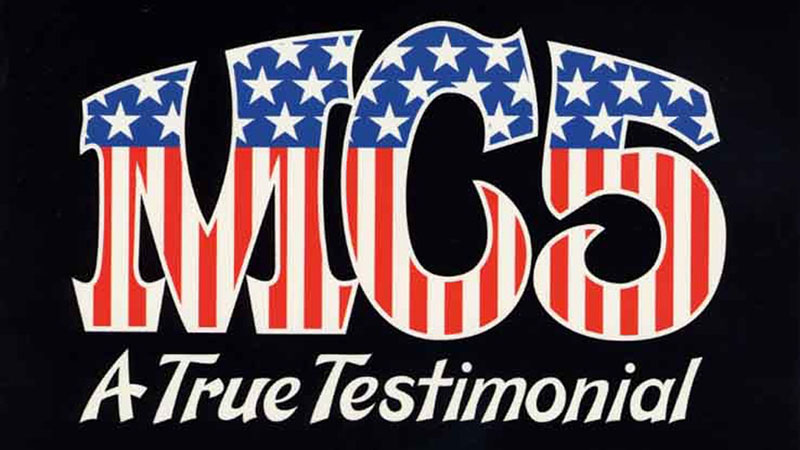
After a few false starts and 16 years after being stopped in its tracks by court action, the long-stalled documentary "MC5: A True Testimonial" is showing signs of coming back to life.
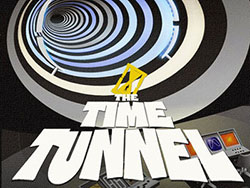
The film tells the story of the MC5. In 2004 - after rave reviews on the festival circuit and on the eve of its commrcial release - filmmakers David C Thomas and Laurel Legier were taken to court by former Five guitarist Wayne Kramer over a claim he had been promised to be the film's musical producer. In March 2007, a court ruled in favour of Legler and Thomas, and the decision was upheld on appeal.
But the damage had already been done. Media preview copies had been widely bootlegged, and securing musical rights to make a commercial release viable proved problematic.
In March this year, a Twitter account with the handle @MC5movie shuddered into life. We now understand there are fresh plans to re-launch the film into movie theatres, digitally and in deluxe physical format...with a caveat: Be patient.
There's no timeline in place and the entertainment market has been severely disrupted by COVID-19. The only certainty is that it will happen evnetually and be worth the wait.
It's now appropriate to take a trip back in The Time Tunnel and revisit a 2001 interview by KEN SHIMAMOTO with DAVID C THOMAS, exhumed from our own archives. Settle in and soak it up while we wait for the main feature.
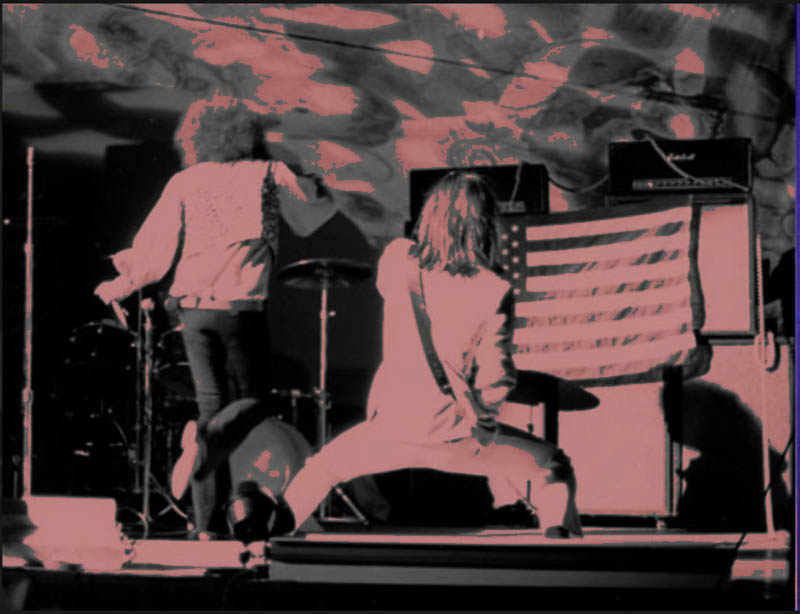
Filmmaker David C. Thomas might not be a name commonly known to fans of Rock Action - but it should be. For the past half-decade, he and his wife/partner Laurel Legler have been pursuing a vision: a feature-length documentary film telling the story of the MC5.
A correspondence with David led to a March 1999 meeting in Austin at South By Southwest, where David and Laurel, and their Future Now Films crew had come to show their seven-minute trailer as part of a panel entitled "The Rise and Fall of the MC5," chaired by former Creem journalist Dave Marsh and including Brother Wayne Kramer and former Five mentor John Sinclair. The trailer was pure riveting excitement, but at the time, the film was little more than a concept and a massive research effort.
In February 2001, as the film entered its post-production phase, I spoke to David from his home in Chicago about how far they've come and what to expect in the near future.
K: We've actually got a pretty decent connection here...the phone system in Texas is kinda like a Third World country sometimes.
You've gotta see if you can get the new president to do something about that.
K: Early indications are not good. I'd hate to be in Northern California right now.
Exactly.
K: Pretty frightening. I had a sign on my office door that said "Don't blame me, I voted for Nader." Then I crossed out "don't."
Yeah, right.
K: There's two million of us that have a lot of shit on our heads. It was NOT the right year to make a Statement.
I would have to agree with you. Idealistically, I wanted to vote for Nader, but in the last week, I said, "You know what? I need to not do this. This is too close and too crucial." We had numerous heated discussions with our cameraman, who is young and idealistic. But I know YOU'RE not young, so there's no excuse!
K: If there is a positive, and I'm not sure that there is, it seems like more people are aware of and inclined to participate in the political process than there were before. Meanwhile, there's a lot of shit that's gonna go down the next four years.
I know, and it's starting already. It's heavy and it's gonna get heavier.
K: Enough trivial poop. Let's talk about the movie. I guess the big question is, when might we see this in theaters?
I'm gonna have to refer you to that last little paragraph of our news release and say that we hope to have some exciting news this year. However, it's all still in flux. We're gonna come out of Kartemquin Films with a rough first cut, which is gonna be fat, and that's gonna be late spring. When that happens, we're still in the process...we have not secured distribution for this. We have not secured all the funding, and that is part of the process that we're gonna have to go through with that first cut. And that will either mean submission to film festivals...
I should say, it MAY include submission to film festivals, but it will definitely include screenings for people we've been in contact with, parties that have shown interest in it.
No film companies have come on board and said, "This is a fantastic project. How much do you need to finish this thing?" Nobody has. Everybody has said, "Oh, let's see it when you've got a first cut." I think we're gonna have a ton of back end interest. We're kinda left out in this place where it's like, we've got to get to that back end by ourselves. That's only happened through contributions, private investment dollars, and a handful of grants...just doin' it as guerrilla filmmakers. That means that a target date necessarily remains nebulous at this point. So I can't say.
K: It can't hurt having the involvement of those "Hoop Dreams" people [Kartemquin].
That's a real coup. The fact that we have landed the film for post-production at Kartemquin is a major coup, and that's a really great thing. Of course, we're paying for post-production services out of pocket and out of the investment dollars, and so on and so forth.
The fact that we're cutting at Kartemquin is no guarantee that we're gonna get distribution, but hopefully, it'll open people's eyes. Kartemquin doesn't let ANY project in...they rarely do out of house stuff. And stuff that they're involved in is always stuff that they believe in, in terms of its social statement and its content.
Outside of "Hoop Dreams," Kartemquin's been around for 30 years, making extremely left-leaning documentaries, documentaries about back in the 1960s...they did a film about "Rising Up Angry", which was the Chicago brother organization to the White Panther Party. It was kind of an offshoot of all that, some of the people were involved in the '68 convention. They've done films about the labour movement and union organizing, the Pullman...
K: ...porter's strike.
Yeah, they did that film called "The Last Pullman Car" back in the 1970s. They've constantly been involved with really interesting films, and they see our film as yet another in that line of sort of righteous endeavours. And of course, "Hoop Dreams" was an incredibly successful documentary, both artistically and commercially.
So, that's not to say that the MC5 will become that, or even get into that same category, but it's a really good thing for the MC5 film. You know how we think of it? The MC5 film, with all the struggling we've done over the last number of years to get the production finished, we have now, in terms of post-production, we have landed the film in one of the safest harbours we possibly could, in terms of editing and finishing.
K: While there might not be a groundswell of political consciousness here in the States, things like the protests in Seattle last year indicate that consciousness is certainly not dead. A story: my daughter who's 16 has a bunch of friends who have kind of a literary and political bent, and one of them is actually aware of the White Panthers and he's talked to all the kids in their cohort about this, and they're AWARE of this. Awareness of the history continues in places where you might not expect to find it.
Sure, absolutely. Right from the beginning, we knew that there would be a lot of support and a lot of interest in a film about the MC5. Not just from the old guys that collect Grande cards or anything like that, or just the Detroit rock and roll maniacs that are in Australia or France or wherever it happens to be, but that there would be a real groundswell of interest from younger kids, who know this band as this sort of legendary thing, or maybe they know a little bit more about the band, but primarily, it's only this name and a couple of records, but it's really important somehow if they know the whole continuum of the evolution of the kind of music they're listening to now, or the social consciousness that they have.
Somehow, the MC5, Ann Arbor, Detroit, John Sinclair, the White Panthers, all of that stuff figures in that continuum, I think for a LOT of kids. Not necessarily your average clubgoing Eminem fan or something like that, but...you know what I'm saying.
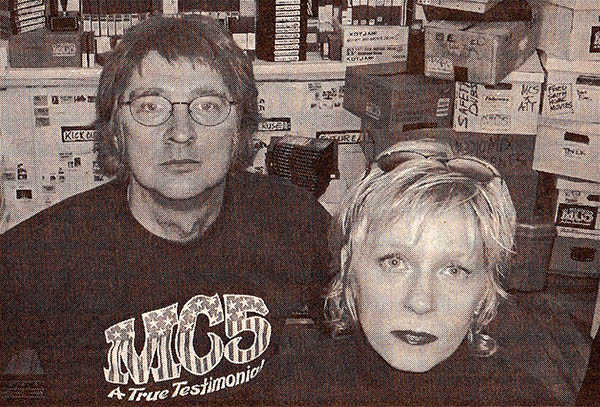 David C Thomas and Laurel Legaler at the time of the court action. Source: A True Tstimonial Facebook.
David C Thomas and Laurel Legaler at the time of the court action. Source: A True Tstimonial Facebook.
K: If only on a legendary level, and to see this film in theatrical release would kind of put a face on that legend and help them understand the effort that went into all of that. Now, you were talking about having a rough cut ready for selected viewings by late spring. Are you looking at SXSW (realizing it's a little early for that) or Sundance [film festivals]?
I can't commit to any of those right now. There's a number of different festivals we're looking at, not just domestically. We're looking at a number of film festivals in England, in New York, in Toronto and Berlin, and perhaps even one in the south of France. [Cannes?!]
K: And it seems Europe would be a very good venue for that.
Exactly. So, at this point, there's obviously submission dates and all of that. We've got those calendars and those submission dates up on the wall, and those are all sort of target dates, but at this point, I don't know yet where it's going to go. It's gonna go SOMEWHERE, I don't know where yet. For the first three years of the project, we didn't know if we could raise enough interest and raise enough money to actually do PRODUCTION of the type of film we wanted to make, and by bits and pieces, we were able to do that, and now we're kind of at the same point that we've been all along with production. We don't know where it's gonna come from, but it's gonna come from SOMEWHERE, and it's gonna go somewhere. It's gonna be a film, and it's gonna come out. We just don't know when yet.
K: Last year saw the release of "The Filth and the Fury," actually the second Sex Pistols documentary. I saw it in probably the crummiest movie theater in Dallas, but the film was out there and it seems like it made it to a lot of cities. Did that give you some hope, in a way?
Yeah. Absolutely. And some of the people who were involved in that film, as well as a few others that have been sort of high-profile documentaries, pop-culture related, are people that we either already are in communication with, or will be. So definitely.
And I think "The Filth and the Fury" is a good comparison for the type of film that we're making as well. Not just in terms of the obvious connections between the MC5 and what happened later in England, but also in terms of the sort of stylistic direction of the Julien Temple Sex Pistols movie.
K: I was very excited to read in your last communiqué about some of the work that you've done since we last spoke. ["High Time" producer] Geoffrey Haslam must have been quite an interesting interview subject.
Fantastic! Absolutely. Every one of them has been absolutely amazing. Geoffrey Haslam, Jon Landau, Danny Fields...those guys are all sort of important parts of the story. They're not as high-profile in the story as John Sinclair was, but in many ways, they're just as important. Danny Fields turns up in a lot of places, but Landau doesn't. Landau doesn't DO interviews, and Geoffrey Haslam...who even knows who Geoffrey Haslam IS? He's sort of totally off the radar, as well as Derek Hughes, the British bass player.
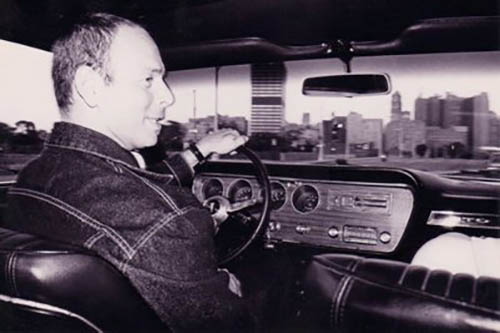 A Wayne Kramer grab from the film.
A Wayne Kramer grab from the film.
K: That's a whole period of the history where there's bits and pieces out there, but putting it together has been kind of problematic.
Sure. Absolutely. And the thing about the interviews with those guys that's kind of like much of this project...we've been able to secure those interviews with them, partly based on our sort of perseverance and our sort of insistence...they didn't do those interviews because of who WE were. They did these interviews because it was about the MC5, and it has to do with in what high esteem they hold this band and their association with them, that was a really important part of each of their lives, and each of them expressed this separately. They said, "This is really important. I'm really thrilled to do this." So yeah, it was very cool.
Geoffrey Haslam was fantastic. We had been in contact with him in England, and we had actually set up...our executive producer Howard Thompson was over in the UK, and he was going to get in touch with our research coordinator over in the UK, whose name is Andy Barding, and Andy Barding and Howard were in the process of setting up...we were going to hire a cameraman over in the UK, and Howard and Andy were going to do the interview for us.
And the same week Howard got there, it turned out that Geoffrey Haslam, as soon as they contacted him, it turned out that he had sort of made some last minute vacation plans, and was in the States that same week. We got in contact where he was staying in the US, which it turned out was Grand Rapids, Michigan, and we contacted him up there, and on the last day of his vacation - he was flying back to the UK the next morning - and about two days before he left, we managed to track him down and said, "Listen, we can throw our crew together and be up there tomorrow if you're willing to spend a couple of hours and do this" and he said, "Come on. Let's do it." So we drove up to Grand Rapids and spent an afternoon with him. It was really great.
He had really fascinating things to say about the process, in terms of where the band was...what HIS impressions of the band were when he met them. He said these guys were really...the way that they looked at that point, that they they were really sort of almost like FRIGHTENING. He met them for the first time in a billiard hall in Ann Arbor and it turned out that, as he put it, they were totally opposite of what they looked like. He said that they were incredibly intelligent, incredibly charming, really nice guys, and he really enjoyed working with them. He said it was just a huge pleasure, and he had nothing but fond memories of it.
K: So he's a physics professor now?
Yeah. He teaches like high school, secondary school physics or something like that. It was a kick. I found out more stuff about Geoffrey Haslam before we did the shoot. I wanted to do some background research and I knew about his production background. But it turns out that he had a musical background as well. He was the saxophone player in a Merseybeat band called the Undertakers, who did a couple of singles. It turns out I had tracks by the Undertakers on a couple of Merseybeat compilations.
K: Jackie Lomax.
Exactly. Yep. And so that was very cool to discover, that he actually had this background that gave him this affinity for doing that. And of course, he was just a staff producer for Atlantic at that time, and he said he'd been working for Atlantic at that point when basically he was assigned the MC5 job, right after finishing the Velvet Underground record.
K: "Loaded".
"Loaded", exactly. He said that he'd just returned from New York to London, and he'd gotten a call from Atlantic, and they said, "The MC5 are in town and they wanna do some tracks." He'd actually met them before that, and then he flew back to England, and they were in England and that's when they set up the basic tracks for "Sister Anne." And then he came back to Detroit and finished the rest of the record.
Talking to Derek Hughes - that kind of terminal phase of the Five is one which hasn't been well-documented. It must have been fascinating.
It was. With a lot of our research, we've managed to document a fair amount of it, but to actually get Derek's perspective on it was really fantastic.. One of the other things too, in addition...all of these guys have made various materials available to us. The materials that we've gathered are stunning. They're beyond my wildest imaginings of even a year and a half ago. Really amazing stuff.
K: You haven't been able to run down [British bassist] Steev Moorhouse or [pirate radio pioneer and late-period MC5 manager] Ronan O'Rahilly yet?
D: Well, Ronan O'Rahilly, we have, yeah. Steve Moorhouse, no, not at all. Ronan O'Rahilly, we've spoken with Ronan several times. We're at this point where we're in post-production now, so the inclusion of a Ronan O'Rahilly interview is, in all likelihood, not going to happen. But, we do have access to Ronan and...if we had limitless funds, we would do an interview with Ronan in the UK; he's agreed to one. Same as everybody else, he's anxious to do it.
Some of those materials that Ronan was associated with have continued to elude discovery, unfortunately. For instance, the multi-camera shoot of the Phun City festival. But, there's really incredibly rare footage, and it's footage from ALL periods.
K: Looks like you're gonna get another opportunity to see Mike Davis...the Luminarios are playing the Empty Bottle [in Chicago] in February.
He's gonna be up here, and yeah, we're looking forward to that. Actually, I think he's gonna stay with us.
K: It's great to see the Luminarios playing someplace besides Arizona and Europe.
Fantastic, yeah, we're looking forward to that. Michael is such a beautiful guy, and that shoot that we did with him down in Arizona was...I mean, there's been a lot of highlights to this whole trip, but the shoot with Michael Davis was, in some ways, the coolest. We had a fantastic time with him. He gave us great stuff. And he's just so charming and wonderful.
K: Yeah. The photos on the site were so terrific.
Thanks. Yeah. And the thing is, it had always been our intention to put up production stills from ALL of these shoots, and it's just a matter of sort of the time and money involved in doing that...we're just not able to do that. We WILL. As we get closer to a release, that website is gonna become active again, and at some point, we'll probably have streaming video up there as well. But that's a ways down the road. For a long time, the website was one of the few places that we could kinda throw our efforts into at sort of nominal cost, in terms of time and money, because we were sometimes six or eight months between shoots.
This past year, it all started coming so hot and heavy. Once we did that Wayne Kramer interview back in September, all the production pieces fell into place after that. With Michael in December, and John [Sinclair] and Dennis [Thompson] in February, and then all these other guys this past summer and fall. I think we had to get over that hump of our major shoot with Wayne, to get to the other stuff.
K: Wayne finally got some content out on his website, and I see [early MC5 photographer] Emil Bacilla has gotten involved in that as well.
Yeah, I think Emil's doing the website for him now, yeah. And of course, he's provided lots of materials to us, as well.
K: How's Dennis doing these days?
The interviews that we did with Dennis over a four-day period last February are really, really, really interesting. There was something that truly was dangerous about the MC5, and there's something about Dennis that is still truly dangerous. Same thing with John Sinclair's stuff as well. We have to walk that line between a FACTUAL representation and a representation that kind of gets to the SPIRIT of it. A totally RIVETING character. When he's running it...you gotta listen to the guy.
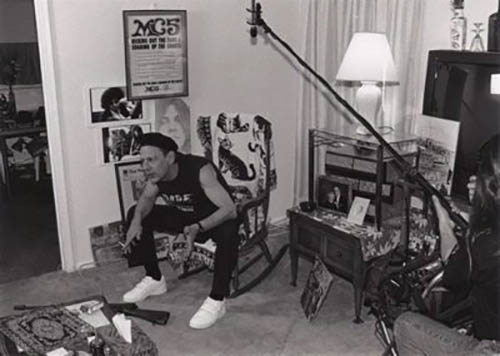 Dennis Thompson during the A True Testimonial shoot.
Dennis Thompson during the A True Testimonial shoot.
K: Sinclair, personally, is kind of a giant who kind of dominates any scene that he's on. He and Rob Tyner are probably the gigantic figures of this whole thing. Next coupla months, what kinda activities do you have on the cards?
The main thing is we're deep in post-production right now, which is basically getting that rough cut in order. We're pretty much finished with the process of taking our 90 hours of interviews and bringing that all down to the essential nine to ten hours of straight narrative telling, from all the different angles, and now we have to take that nine or 10 hours and distill IT down to the ESSENTIAL one and a half to two hours, and at the same time, bringing in all of that archival material. So it's a laborious distillation process of all that stuff.
So, that's where we're at right now. We're in the process of scanning hundreds and hundreds of still materials that'll be incorporated into the cut. It's the whole editing process.
K: Of course, you're not going to be able to incorporate ALL the material that you've been able to unearth, but the medium of DVD maybe gives you an opportunity to do a little more of that.
Absolutely. That's one of the things that we're planning. We're definitely planning a DVD release, and a number of entities have already contacted us, which have made offers for DVD rights.
Now, we're interested in keeping this...not separating any of those media entities at this point, because we DO want to go for theatrical distribution, and DVD, home video rights...that looms large in terms of securing theatrical distribution, so as much as we're trying to secure the financing to continue with post-production and complete post-production, at the same time, we don't want to separate those DVD rights at this time, even though we've had some offers.
K: You don't want to jeopardize the integrity of the project by focusing on things like that, that are a little further down the road.
Exactly.
K: There's a quote in your latest communiqué from Rob, which I love, about "the discipline of waiting": "A warrior's got to know the times and that there is timing even in the void."
Absolutely. And for us, it's by no means a void anymore. Perhaps for people that are on the outside looking at it, and looking at that website that hasn't been updated, or not being able to see the footage and so on, it IS something of a void. I included that because I know that people are out there....some people hang on every communiqué, and the fact that we HAVEN'T sent things out for quite awhile, people are like, "What's going on?"
But in fact, at our end, it is by no means a void anymore. It is a concrete thing, and it IS happening. Just the fact that we've got all this stuff in the can...it's absolutely amazing. We've got a 40-minute digitally-videotaped interview with Derek Hughes in the can. We've got 80 minutes with Geoffrey Haslam, we've got 80 minutes with Danny Fields. We've got about 120 minutes with Jon Landau. We've got about 12 hours with John Sinclair, we've got about 15 hours with Dennis Thompson, 15 hours with Michael Davis, and close to 30 hours with Wayne Kramer, and that stuff's all in the can, it's all digital video. It's all been transferred to digi-Beta and laid off to Beta SP, and we're loading it in Avid...we're moving on this thing. So it's concrete, it's real.
K: Just having seen the trailer, the energy and freneticism of the thing, I know you're going to do a great job.
And you know what? For along time, we told people, "The film is gonna be like the trailer," not really knowing for sure if we could actually make it like the trailer, with that kind of content and that kind of energy level and so on, and we are certain now that we can. Obviously, you can't do a two-hour film that's that frenetic; there's pacing and there's quiet parts, and introspective sort of segments, but it's there. It's actually in the can to make the film that we always envisioned, which is amazing. It's just fantastic.
K: Now it's time to apply the filmmaker's craft to all this great material that you've unearthed.
Exactly. One of the things that I always want to make sure that I tell people is that this film is clearly about the MC5. It's about their music, and it's about their politics, and it's about the historical context, but what we always wanted to do, and it IS what we're gonna do, is...this film is really gonna be character-driven. It's gonna be driven by the characters of those five guys.
Who were they? How did they do this thing? What was it that made them so special? What was it that made the five individuals that played together...the sum was greater than the individual parts, and they really did create this magical sort of thing, they created this magical sort of moment in history. As a filmmaker, that's one of the questions that I set out to answer: Who were these guys?
K: Yeah, ultimately, the human resonance of the film will reside in the characters.
That's absolutely true, and we set out to make a character-driven film, because I think, all the politics aside, and all the music aside, that's the question as a filmmaker that I have to answer for myself, and I think ultimately, that's the thing an audience wants to know, too. Who were these guys? How and why did this thing happen?
Because I think it's one thing to say, "Here's this incredible music and they were involved with this incredible historic milieu and this radical critique of the American Ruse," but how come? What is it that made them what they were? And I think ultimately the answer is the individual characters that came together to do that.

